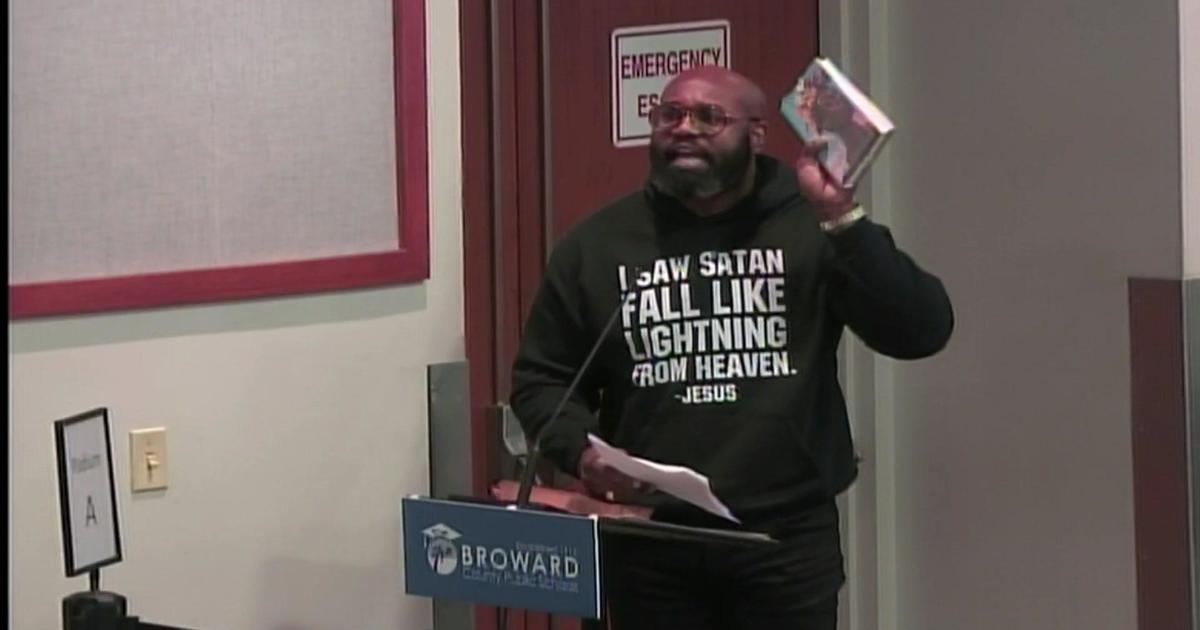Board Backs Stewart On Test Scores, School Grades
Follow CBSMIAMI.COM: Facebook | Twitter
TALLAHASSEE (NSF) – The Florida Board of Education voted overwhelmingly Wednesday to back Commissioner Pam Stewart on proposals about test scores and school grades, turning aside concerns from business and education-reform groups.
But even as the board went ahead with Stewart's ideas on a pair of 6-1 votes, some lawmakers were floating ideas for making changes that could complicate the process of calculating school grades in the future.
Board members considered where to set two critical benchmarks of the state's education accountability system: "cut scores" that determine the levels of achievement students get based on their performances on standardized tests and the school grades tied to how well students do on those tests.
The changes are necessary because of the state's move to the Florida Standards Assessments, a set of tests given to public school students. Stewart's proposals opened up a rare battle between board members, who were appointed by a Republican governor, and a coalition of business and education-reform groups that generally back the GOP's education policies.
Those groups have pushed for the state to line up what is essentially considered a passing score on the state test to the National Assessment of Educational Progress, a highly regarded, nationwide standardized test. That would have increased the number of students who would fall short of passing the Florida exams.
"Too often, Florida's employers have difficulty finding and hiring qualified talent. ... We need to ensure our students are not only successfully graduating from high school, but they are doing so based upon honest indicators they have actually achieved proficiency in math and English language arts," wrote Mark Wilson, president and chief executive officer of the Florida Chamber of Commerce, in comments submitted to the board.
Critics were also disappointed in Stewart's recommendations for school grades under the new system, arguing that more students need to be required to pass the tests for schools to receive certain grades.
The system the board adopted would see 189 schools receive "F" grades for the 2014-15 school year, according to a simulation run by the department. But under one of three options proposed by the Foundation for Excellence in Education, an advocacy group founded by former Gov. Jeb Bush, the number of "F" schools would have been 503.
School superintendents, who have asked for the school grading system to be paused altogether, said they supported Stewart's proposal over the others. Leon County Superintendent Jackie Pons said proceeding with school grades carefully was particularly important because schools that have historically struggled wouldn't be able to rely on how much progress students made on the new tests in the first year.
The measurement for "learning gains" will not take place until the grades for the 2015-16 school year.
Pons and others said the stigma of receiving failing grades is a blow to morale at schools.
"When we give these schools an 'F' grade, what we do to those schools for a long time is devastating," Pons said.
Some board members who supported Stewart's proposal said they would be open to revisiting the school-grade standards later this year, when the department gets ready to issue the next round of report cards. But board member John Padget, the only member to vote against Stewart's proposals, was skeptical about the chances to increase standards and cause more schools to fail.
"Are we prepared when we raise the bar (that) there might be more than 189?" he said. "That will be the pressure we'll be under."
As board members debated the proposals in the Cabinet room at the state Capitol, two top aides to Gov. Rick Scott sat in the audience. After the meeting, Stewart didn't directly answer a question about how much input Scott's office had in crafting the standards or how board members, appointed by the governor, voted.
"We work closely with the governor's office on many policy issues, so this would have been like any other policy issues," she said. "Again, as I mentioned before, I have the luxury of being able to make the recommendation that I believe to be the best one, and that's what I did here."
Meanwhile, some state lawmakers are already looking to introduce another element into the testing debate. Sen. Don Gaetz, a Niceville Republican who chairs the Senate's education-funding committee, has introduced legislation that would allow districts to use national standardized tests like the SAT and ACT instead of the state's exams.
Gaetz said Wednesday the legislation (SB 1360) has bipartisan support. However, it doesn't currently have a House counterpart.
While shying away from directly addressing whether the bill was a good idea, Stewart indicated to reporters that it could complicate the state's accountability efforts.
"I think if there were an alternate that were provided, it puts us in a bad spot from the standpoint of, we're no longer aligned to what's being taught," she said. "Our assessment has to be aligned to what's being taught."
Gaetz said the current test also wasn't completely lined up to the state's education standards and that tests like the SAT and ACT can measure whether students are ready to move on.
"If it's good enough to get you into a college, it ought to be good enough graduate you from a Florida high school," he said.
The News Service of Florida's Brandon Larrabee contributed to this report.



